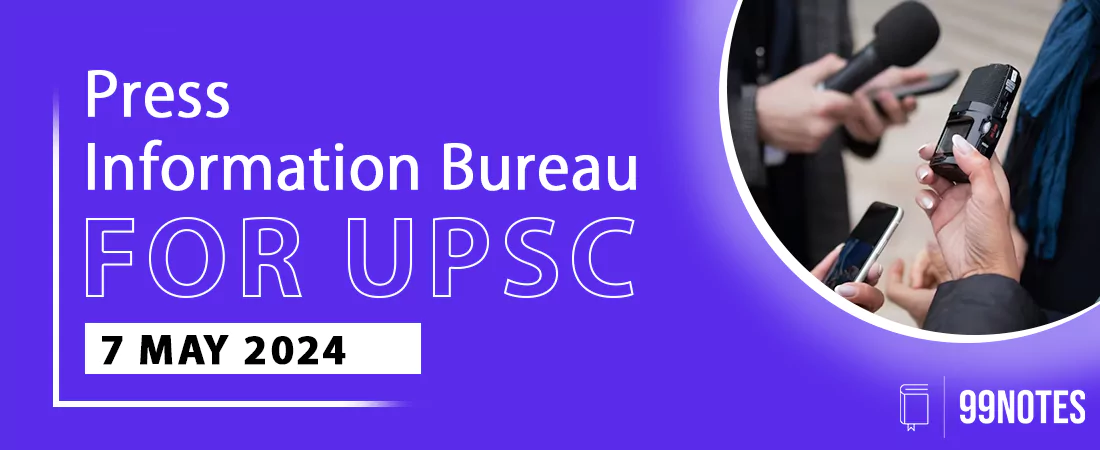7 May 2024 : PIB Summary for UPSC
1. ECI directs responsible and ethical use of social media platforms by political parties and their representatives
| Topic: GS2 – Indian Polity |
| Context |
| ● The Election Commission of India instructs political parties to responsibly use social media in elections, warning against misinformation and deep fakes.
● Parties must remove offensive content within three hours from notification, adhere to legal frameworks, and report violations to platforms and the Grievance Appellate Committee. |
Analysis of the news:
- The Election Commission of India (ECI) has issued directives to political parties regarding the responsible and ethical use of social media during election campaigning to ensure fair competition.
- Parties must adhere to existing legal provisions, including the Information Technology Act, 2000, the Indian Penal Code, and the Representation of People Act, 1950 and 1951, as well as the Model Code of Conduct.
- They are specifically warned against the use of AI-based tools to create deep fakes and dissemination of misinformation.
| What Are Deep Fakes? |
| ● Deep fakes are synthetic media created using artificial intelligence techniques.
● They involve manipulating audio, images, or videos to make it appear as if someone said or did something they didn’t. ● Deep fakes can convincingly depict people doing or saying things that never happened. ● They often involve face swapping or voice cloning technology to create realistic but fake content. ● Deep fakes raise concerns about misinformation, as they can be used to spread false information or manipulate public opinion. ● They also pose challenges for detecting and combating fake content online. |
- Prohibited actions include circulating false or misleading information, derogatory content towards women, using children in campaigns, and depicting violence or harm to animals.
- Parties must promptly remove any such content within three hours of being notified, take action against responsible individuals within their party, report unlawful information and fake accounts to platforms, and escalate persistent issues to the Grievance Appellate Committee under the Information Technology (Intermediary Guidelines and Digital Media Ethics Code) Rules, 2021.
| How social media can affect elections? |
| Pros:
● Increased Voter Engagement: Social media platforms encourage political discussion and engagement among voters, leading to increased awareness and participation in elections. ● Accessibility: Social media provides a platform for political candidates to reach a wide audience at relatively low costs, levelling the playing field for candidates with limited resources. ● Transparency: Social media allows for greater transparency in political campaigns, as candidates can directly communicate their platforms and policies to voters without intermediaries. ● Real-Time Updates: Voters can receive real-time updates on campaign events, debates, and news through social media, enabling them to make informed decisions. ● Community Building: Social media fosters online communities of like-minded individuals, allowing voters to connect with others who share their political views and mobilise support for specific candidates or causes. Cons: ● Misinformation: Social media platforms can be used to spread false or misleading information, influencing voter perceptions and undermining the integrity of elections. ● Polarisation: Echo chambers on social media can reinforce existing biases and polarise political discourse, leading to increased divisiveness and hostility among voters. ● Foreign Interference: Hostile actors may exploit social media to spread disinformation or interfere in elections, posing threats to electoral integrity and democratic processes. ● Privacy Concerns: Social media users’ personal data may be harvested and exploited for targeted political advertising without their consent, raising concerns about privacy and manipulation. ● Algorithmic Bias: Social media algorithms may prioritise sensational or divisive content, amplifying extreme viewpoints and suppressing moderate voices, exacerbating polarisation and undermining democracy. |
| PYQ: Use of Internet and social media by non-state actors for subversive activities is a major concern. How have these have misused in the recent past? Suggest effective guidelines to curb the above threat. (200 words/12.5m) (UPSC CSE (M) GS-3 2016) |
| Practice Question: Discuss the potential impact of social media on electoral processes, highlighting its role in shaping public opinion, political discourse, and voter behaviour. Assess the challenges posed by misinformation, deep fakes, and polarising content, and suggest measures to ensure the integrity and fairness of elections in the digital age. (250 Words /15 marks) |
2. Union Finance Minister Smt. Nirmala Sitharaman administers Oath of Office to Justice (Retd.) Sanjaya Kumar Mishra as the first President of GST Appellate Tribunal in New Delhi
| Topic: GS2 – Indian Polity – Statutory Bodies |
| Context |
| ● Smt. Nirmala Sitharaman appointed Justice (Retd.) Sanjaya Kumar Mishra as President of the GST Appellate Tribunal (GSTAT) in New Delhi.
● GST Appellate Tribunal (GSTAT), under the Central Goods and Services Tax Act, 2017, aims to resolve GST disputes swiftly and reduce the burden on higher courts. |
Analysis of the news:
- Nirmala Sitharaman administered the oath of integrity and secrecy to Justice (Retd.) Sanjaya Kumar Mishra as the President of the GST Appellate Tribunal (GSTAT) in New Delhi.
| GST Appellate Tribunal (GSTAT) |
| ● Establishment: GSTAT is a statutory bodies established under Section 109 of the CGST Act, 2017.
● Responsibility: It resolves disputes arising from GST laws. ● Benches: Includes a principal bench in New Delhi and multiple benches in states, decided by states with council approval. ● Members: Each bench comprises two technical and two judicial members, with equal representation from the Centre and states. ● Hearing Procedure: Not all four members sit for every case; it depends on the threshold or value of dues involved. ● Efficiency: Designed to ensure efficient resolution of GST-related disputes nationwide. ● Accessibility: Provides taxpayers with a fair and accessible appellate process. |
- Justice (Retd.) Mishra’s appointment marks the operationalization of GSTAT, vital for resolving GST-related disputes.
- GSTAT is the Appellate Authority under the Central Goods and Services Tax Act, 2017, to hear appeals against orders of first appellate authorities.
- It comprises a Principal Bench in New Delhi and 31 State Benches across India, with ongoing appointments for Judicial and Technical Members.
- GSTAT aims for swift, fair, and effective resolution of GST disputes, easing the burden on higher courts and enhancing the GST system’s efficiency.
- Justice (Retd.) Mishra, a former Chief Justice of the Jharkhand High Court, was selected by a Search-cum-Selection Committee headed by the Chief Justice of India.
- The establishment of GSTAT is expected to foster a more transparent and efficient tax environment in India.
| PYQ:
Q.1 Explain the rationale behind the Goods and Services Tax (Compensation to States) Act of 2017. How has COVID-19 impacted the GST compensation fund and created new federal tensions? (250 words/15m) (UPSC CSE (M) GS-3 2020) Q.2 Enumerate the indirect taxes which have been subsumed in the Goods and Services Tax (GST) in India. Also, comment on the revenue implications of the GST introduced in India since July 2017. (150 words/10m) (UPSC CSE (M) GS-3 2019) |
| Practice Question: Discuss the significance of the GST Appellate Tribunal (GSTAT) in resolving disputes related to the Goods and Services Tax (GST) regime. Evaluate its role in reducing the burden on higher courts and ensuring effective implementation of GST laws. (250 Words /15 marks) |



